Key takeaways:
- Transitioning to a plant-based diet is a gradual process that can be made enjoyable by starting slow, exploring new recipes, and involving community support.
- Meal planning and preparation are crucial for maintaining a plant-based lifestyle, allowing for creativity and efficiency while avoiding the temptation of takeout.
- Key nutritional considerations include ensuring adequate protein intake and supplementation of vitamin B12, while also finding plant-based sources of omega-3 fatty acids.
- Adopting a plant-based diet not only improves personal health, such as reducing cholesterol, but also contributes positively to environmental sustainability.
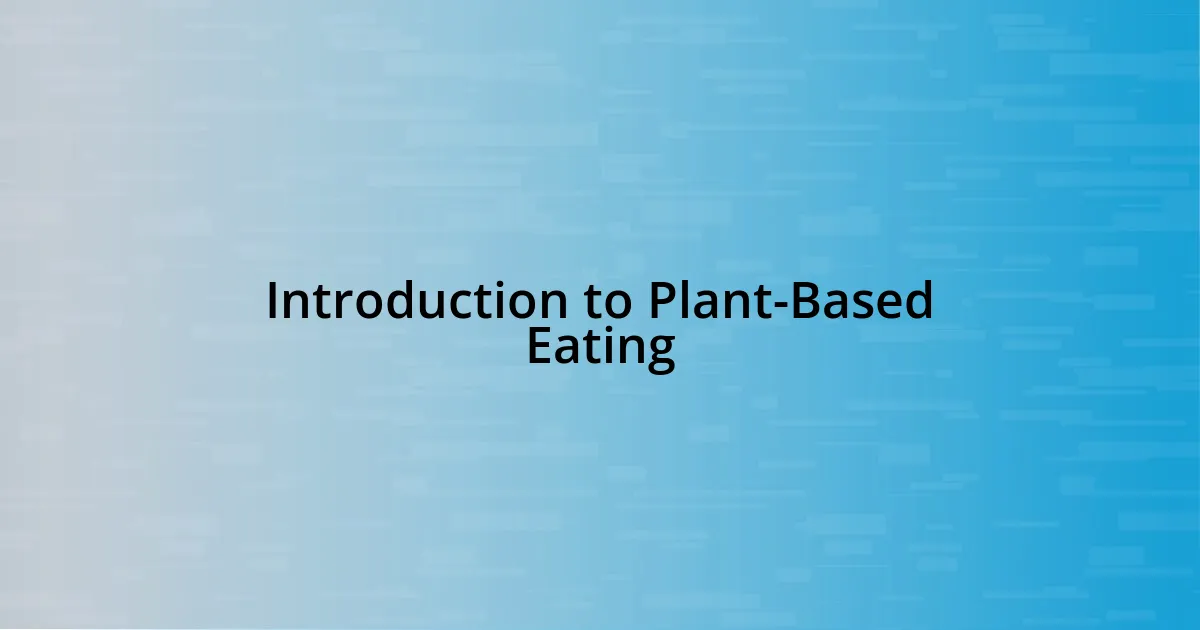
Introduction to Plant-Based Eating
Plant-based eating has become a vibrant tapestry of flavors and health benefits that many people are embracing today. I still remember the first time I tried a colorful Buddha bowl; it was an eye-opener. Why did I wait so long to eat this way? It’s fascinating how incorporating more fruits and vegetables has transformed not only my meals but my mood and overall well-being.
As I explored this journey, I realized that plant-based eating goes beyond mere diet—it’s a lifestyle choice rooted in personal health and environmental consciousness. Think about it: every meal is an opportunity to nourish my body and reduce my ecological footprint. I felt an overwhelming sense of joy and empowerment when I realized I could make choices that benefit both myself and the planet.
People might wonder if plant-based options can satisfy their cravings. I can assure you, they absolutely can! The first time I savored a rich, creamy avocado pasta, I felt like I had unlocked a secret world of culinary possibilities. This way of eating isn’t about deprivation; it’s about discovering new passions for food that nourish us from the inside out.

Transitioning to a Plant-Based Diet
Transitioning to a plant-based diet is both exciting and challenging, a journey that requires some intentional steps. I remember feeling overwhelmed at first—where to begin? But once I started to replace my weekly grocery list with vibrant veggies, whole grains, and legumes, everything changed. I found a whole new world of flavors, and honestly, my taste buds rejoiced.
Here are some tips that helped me along the way:
- Start Slow: Don’t rush it. I began by designating one or two plant-based meals each week.
- Explore New Recipes: I dove into online cooking shows and blogs, which became a treasure trove of inspiration for creative plant-based dishes.
- Focus on Whole Foods: Rather than processed alternatives, I aimed to include more fruits, vegetables, nuts, and grains in my diet.
- Join a Community: Connecting with like-minded individuals made the journey a lot more fun; sharing recipes and experiences was invigorating.
- Practice Mindfulness: I paid attention to how my body felt after eating plant-based meals—it was a game changer! I noticed I had more energy and felt lighter.
Each of these steps made transitioning feel less like a chore and more like an adventure. It’s about embracing new flavors and nourishing your body in ways you may not have thought possible.
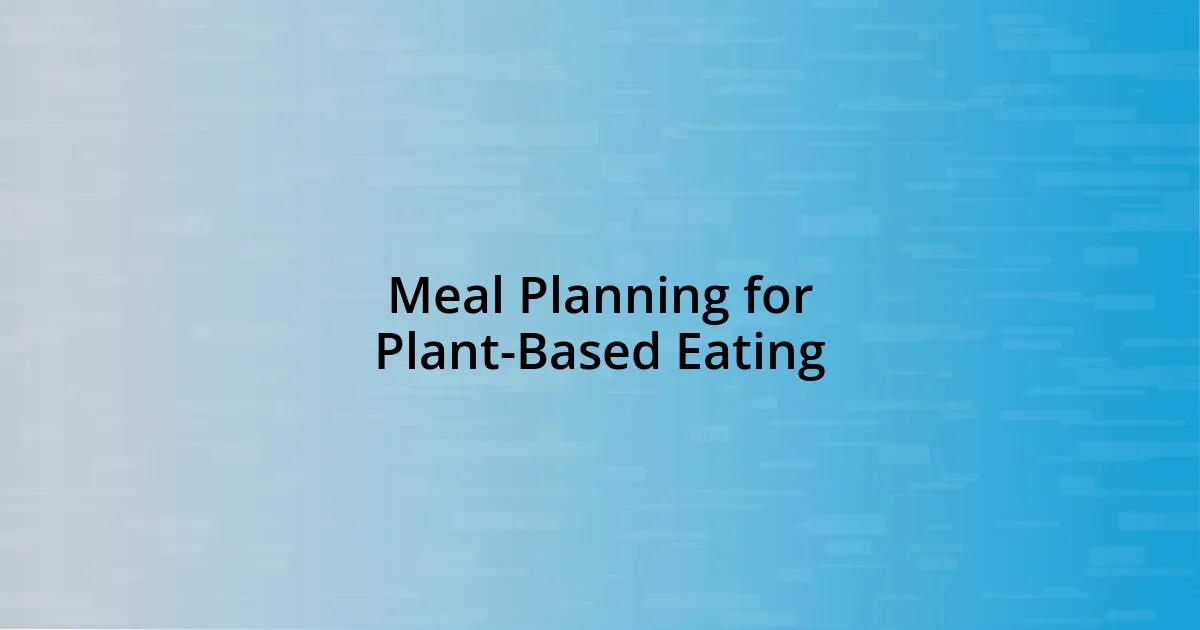
Meal Planning for Plant-Based Eating
Meal planning for plant-based eating has become a delightful part of my weekly routine. I’ve come to appreciate the art of creating a balanced menu that incorporates a variety of ingredients. For instance, one week, I experimented with different legumes and grains. My black bean tacos paired with quinoa salad not only filled me up but also introduced new textures and flavors that excited my palate. Planning ahead allows me to be both creative and efficient, ensuring I never feel deprived of my favorite meals.
I often find that Sundays are the best time for me to set aside a couple of hours for meal prep. It’s a ritual I’ve come to cherish. Chopping colorful veggies, cooking a big batch of lentils, and whipping up some homemade dressing is not only therapeutic but also fuels my week with healthy options. Plus, having meals ready to grab and go keeps me on track, especially during hectic days when takeout might usually be tempting. I even label my containers with fun names—it adds a personal touch that makes healthy eating feel special.
To streamline your own meal planning, consider creating a comparison table that highlights your options. This helped me choose between meals at a glance. Check out the table below; it organizes my go-to plant-based meals by ingredients, preparation time, and nutritional benefits. It’s a fun way to visualize the delicious choices waiting for you!
| Meal | Main Ingredients | Preparation Time | Nutritional Benefits |
|---|---|---|---|
| Chickpea Salad | Chickpeas, Cucumber, Tomato | 10 mins | High in protein and fiber |
| Lentil Curry | Lentils, Coconut Milk, Spinach | 30 mins | Rich in iron and vitamins |
| Stuffed Bell Peppers | Bell Peppers, Quinoa, Black Beans | 35 mins | Loaded with antioxidants and protein |
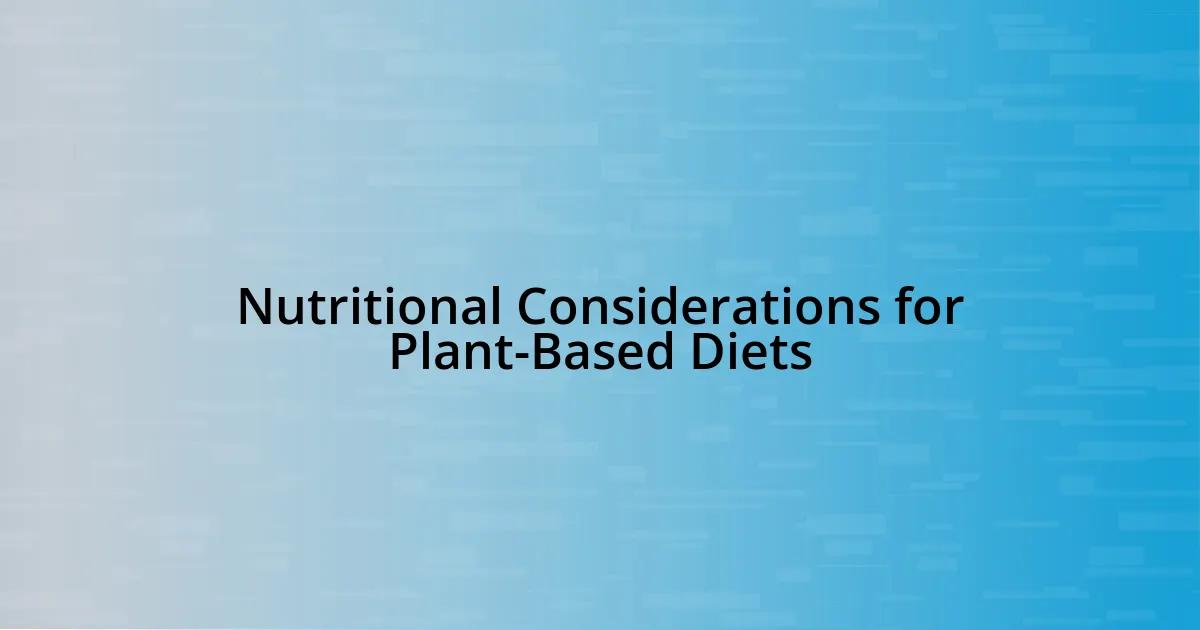
Nutritional Considerations for Plant-Based Diets
Nutritional considerations for plant-based diets are essential for achieving balance and health. One aspect I pay close attention to is protein intake. Initially, I felt a bit concerned about getting enough protein, but I soon discovered a variety of sources, like lentils, chickpeas, and quinoa. A simple realization struck me: plant-based protein can be just as satisfying, if not more so, than animal-based options.
One nutrient that can be tricky is vitamin B12. Since I transitioned to a plant-based diet, I’ve been diligent about supplementation and incorporating fortified foods into my meals. I remember the first time I found a plant-based milk that was fortified with B12; it felt like a small victory. Have you considered how much B12 you might be getting? It’s crucial for energy and overall well-being.
Another vital consideration is the balance of omega-3 fatty acids, often found in fish. I turned to flaxseeds and chia seeds to fill that gap. The first time I added them to my smoothies, I was captivated by their subtle nutty flavor. It made me wonder: how many delightful surprises await us in plant-based eating? Embracing these nutritional nuances transforms the way we view food and health, offering a delicious path to well-being.

Cooking Tips for Plant-Based Meals
Cooking plant-based meals can be a fun and rewarding experience once you get the hang of it. I always keep my pantry stocked with essentials like canned beans, whole grains, and assorted spices. This way, I can whip up a nourishing meal without a last-minute dash to the grocery store. Have you ever felt overwhelmed by ingredient lists? Simplifying your recipes by using what you already have can make all the difference.
When I first started, I made the mistake of over-complicating my meals. I remember spending an entire Sunday afternoon on a single recipe that ultimately didn’t sit well with my family. It was a lightbulb moment for me: simplicity often reigns supreme. Now, I focus on a few fresh ingredients and allow their natural flavors to shine. For example, tossing together sautéed spinach, garlic, and cherry tomatoes can create a delectable side dish in just 10 minutes. Why not give it a try?
Experimentation is key in the kitchen, particularly with herbs and spices. Initially, I played it safe, sticking to salt and pepper, but once I ventured beyond that, my meals transformed. A sprinkle of smoked paprika can elevate roasted veggies, while fresh basil adds a bright note to pasta dishes. Have you explored your spice cabinet lately? If not, I encourage you to dive in—the excitement of discovering new flavors can make plant-based cooking a true adventure!
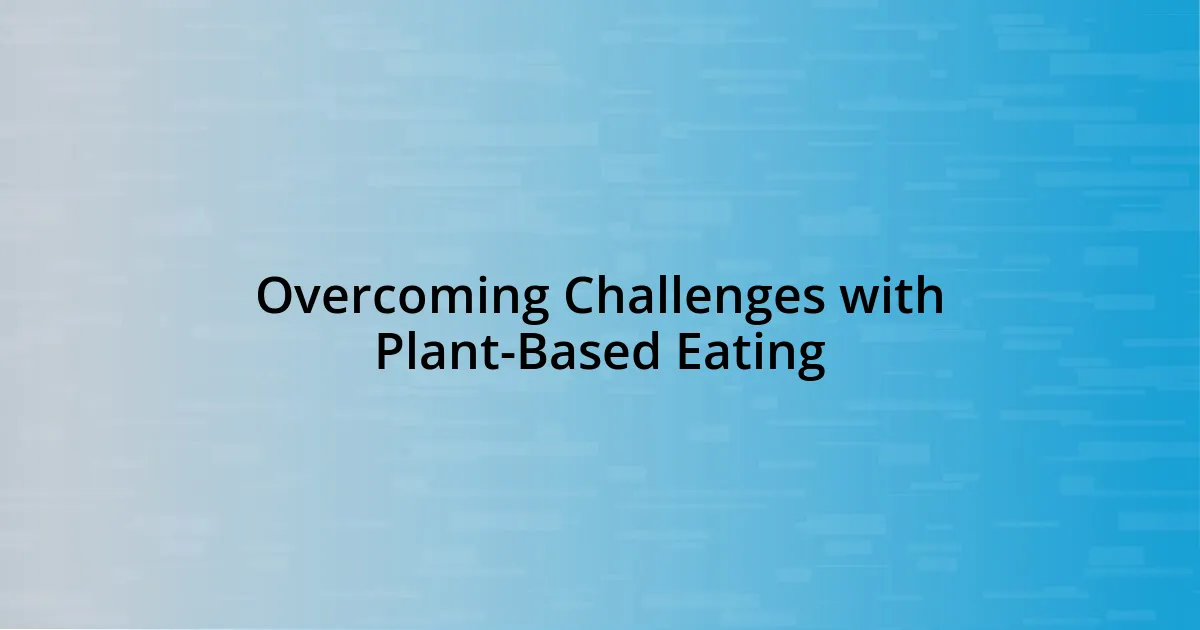
Overcoming Challenges with Plant-Based Eating
Transitioning to a plant-based diet brought its share of challenges, but overcoming them became a part of my journey. I distinctly remember the social situations that caught me off guard. Skipping meat at family gatherings often led to awkward conversations, but I learned to communicate my food choices with confidence. Sharing my enthusiasm about plant-based meals often sparked curiosity. Have you ever felt hesitant to speak up about your diet around friends and family?
Another hurdle I faced was the temptation to revert to old eating habits. I often craved familiar comfort foods, which made me question my commitment. To tackle this, I started recreating my favorite dishes using plant-based ingredients. Finding a delicious vegan mac and cheese that satisfied my cravings felt like a turning point. It made me rethink comfort food—what if we could redefine it in healthier ways?
Lastly, I discovered the importance of meal prep. In the initial days, I struggled with what to eat on busy nights, which led to some unplanned takeout. Now, I dedicate an hour each week to prepare staples like roasted veggies or grain bowls. This simple practice not only saves time but also I find it fuels my creativity for the week ahead. How do you approach meal planning? Adopting this habit has transformed my experience with plant-based eating, turning potential obstacles into opportunities for growth.
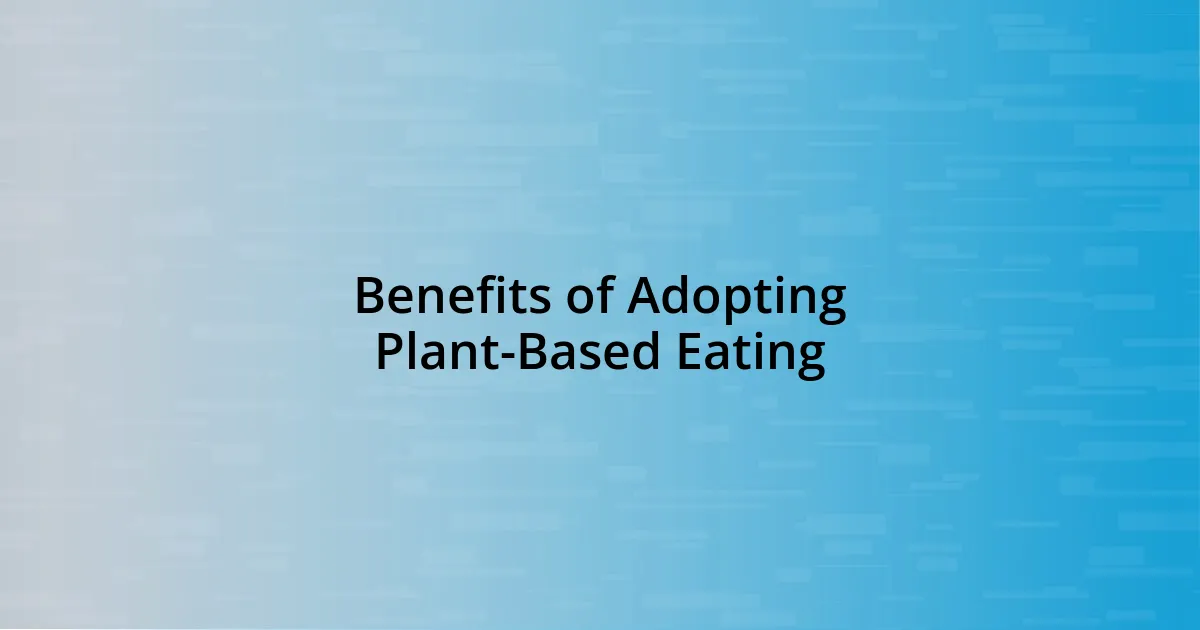
Benefits of Adopting Plant-Based Eating
Adopting a plant-based diet has been a transformative experience for me, particularly regarding my health. I vividly recall my doctor recommending that I reduce my cholesterol levels. After diving into plant-based eating, I noticed a remarkable drop in my cholesterol numbers at my next check-up. Have you ever considered how food can directly impact your well-being? It’s like discovering a secret weapon for health right on my plate.
Another benefit I’ve embraced is the environmental impact of my choices. I remember the first time I learned about the carbon footprint of meat production—it hit me hard. Switching to plant-based meals made me feel like I was taking an active role in the fight against climate change. It’s empowering to know that my daily choices contribute to a healthier planet. Isn’t it amazing to think that our forks can be tools for change?
Additionally, I’ve found that plant-based eating fosters creativity in the kitchen. One evening, I impulsively blended up some leftover vegetables and grains, resulting in a satisfying veggie burger that became my new favorite. That moment was enlightening: who knew that leftovers could yield delicious new meals? Have you ever felt surprised by your own culinary inventions? Embracing this lifestyle has undoubtedly opened my eyes to endless possibilities.
















